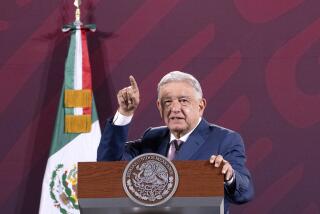Mexico Dismisses Finance Minister, a Key Figure in Debt Talks
- Share via
MEXICO CITY — In a move surprising for such uncertain economic times, the Mexican government Tuesday dismissed Finance Minister Jesus Silva Herzog, a key participant in the country’s negotiations over repayment terms of its massive foreign debt.
Sources close to the office of President Miguel de la Madrid said that Silva Herzog was “replaced” because his views followed too closely the demands of international bankers and “didn’t take internal politics into consideration.”
Specifically, government sources said, Silva Herzog and De la Madrid differed on the tack to take in negotiations with international bankers over repayment of Mexico’s foreign debt.
Silva Herzog pressed for negotiations with banks that, even if they resulted in delayed payments, would maintain good relations with the country’s creditors. He is considered by international bankers as a proponent of maintaining interest payments on the debt.
De la Madrid favors the formulation of a policy in which the banks would have to make allowances for Mexico’s sacrifices and difficulties in paying its enormous debt. In recent months, he has emphasized that payments must be adjusted to “Mexico’s capacity to pay.”
Uncertainty over a possible debt moratorium helped sparked panic selling of Mexican pesos two weeks ago. Since then, the peso has gradually regained value.
“Just when things were settling down, now comes this,” said a U.S. banker who asked not to be identified. “It’s like a roller coaster here.”
It is not clear whether the firing foreshadows a unilateral end or limit to debt payments. A source close to the presidency said that Mexico is still working with the International Monetary Fund on a debt solution.
Mexico, which owes close to $100 billion to foreign banks, has been lobbying for new loans, but banks have demanded an IMF blessing on Mexico’s economic program before they will lend more money.
In any case, the source said, Silva Herzog had grown increasingly isolated in Cabinet meetings over the debt issue. “He was an obstacle to consensus,” the source said.
Tuesday’s announcement said only that a new finance minister was “designated” to replace Silva Herzog.
Gustavo Petricioli, director of Nafinsa, a national credit agency, was named new finance minister.
Silva Herzog, 51, has been finance minister since 1982, when Mexico first experienced trouble meeting payments on its foreign debt. Due to falling prices of its main export, oil, Mexico is again in danger of defaulting on the debt.
Silva Herzog was also considered a possible presidential candidate to succeed De la Madrid in 1988. However, in Mexico’s system, the president chooses his own successor and Silva Herzog’s ouster probably means an end to his chances.
Mexico’s economy has stagnated for most of five years and is in a deep recession this year. Aggravating the accompanying high rates of unemployment is a near-runaway inflation.
An accord with the IMF will probably require cuts in government spending, which would further depress the economy in the short term and create potential political problems for the ruling Institutional Revolutionary Party.
Petricioli, 57, is a former economics professor who has worked at the Bank of Mexico and in the Finance Ministry for many years.
“The word on Petricioli is that he’s a yes-man. De la Madrid will take charge,” one Mexican economist said.
More to Read
Sign up for Essential California
The most important California stories and recommendations in your inbox every morning.
You may occasionally receive promotional content from the Los Angeles Times.













